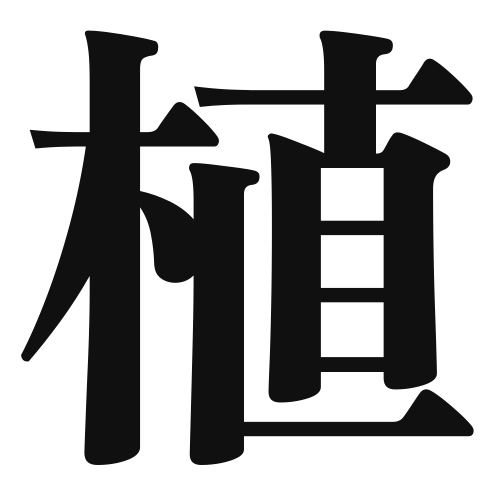1. Overview of Meaning
The kanji “植” (shoku) means “to plant” or “to grow.” It is commonly associated with the act of planting trees, flowers, or other vegetation, and it conveys the idea of nurturing and cultivating life.
2. Formation and Radical
Formation of the Kanji: The kanji “植” is a compound character (会意文字) that combines elements representing “tree” (木) and “to set” or “to establish” (直). This combination reflects the action of establishing or setting a tree in the ground.
Radical: The radical of “植” is “木” (tree), which is often found in kanji related to plants and trees.
3. Examples of Usage
Common Words and Phrases: Some frequently used words that include “植” are:
- 植木 (うえき, ueki) – “potted plant”
- 植民地 (しょくみんち, shokuminchi) – “colony”
- 植える (うえる, ueru) – “to plant”
Example Sentences in Daily Conversation:
- 春になったら、庭に花を植えます。 (Haru ni nattara, niwa ni hana o uemasu.) – “When spring comes, I will plant flowers in the garden.”
- 彼は新しい木を植えました。 (Kare wa atarashii ki o uemashita.) – “He planted a new tree.”
4. Synonyms and Antonyms
Similar Kanji: A similar kanji is “育” (iku), which means “to raise” or “to nurture.” While “植” focuses on the act of planting, “育” emphasizes the growth and development of living things.
Antonyms: An antonym of “植” could be “伐” (batsu), which means “to cut down” or “to fell,” representing the opposite action of removing plants or trees.
5. Cultural and Historical Background
Relation to Japanese Culture: The act of planting is deeply rooted in Japanese culture, symbolizing growth, renewal, and the connection to nature. Festivals such as Hanami (flower viewing) celebrate the beauty of blooming plants.
Proverbs and Idioms: One common proverb is “植えた木は育つ” (Ueta ki wa sodatsu), which translates to “The tree you plant will grow,” emphasizing the importance of nurturing efforts for future rewards.
